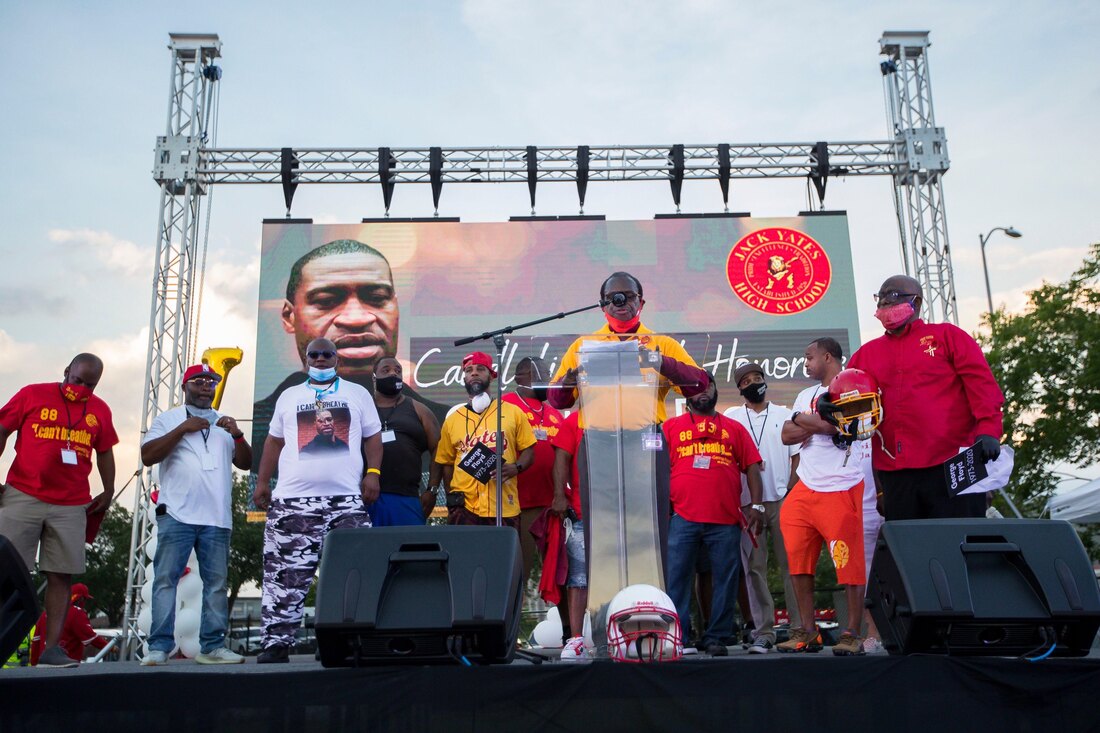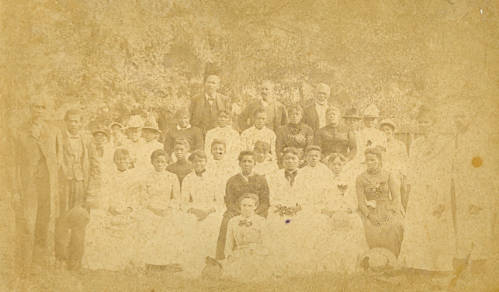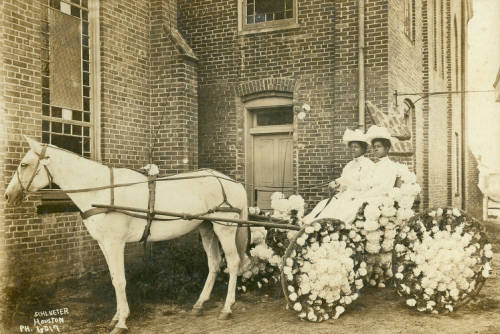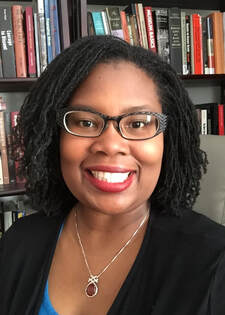 Houston, TX, USA. 8th June, 2020. Members of the Yates High School championship football team speak during a candlelight vigil honoring George Floyd on Monday, June 8, 2020, at Jack Yates High School football field. Credit: Karen Warren/ZUMA Wire/Alamy Live News Credit: ZUMA Press, Inc. / Alamy Stock Photo Jack Yates, George Floyd, and Juneteenth This year’s 148th celebration of Juneteenth in Houston’s Emancipation Park resonates with new meaning. Typically, the celebration draws thousands of residents and visitors to Houston’s Third Ward annually. However, because of COVID-19, the parade and day-long slate of outdoor activities have been replaced with a robust program of events that will be streamed around the world. Just a few weeks ago, such a shift would have been monumental. But then, thousands of miles from his hometown and beloved Third Ward community, a police officer killed George Perry Floyd, Jr, ignoring his desperate cry, “I can’t breathe.” As video of Floyd’s death circulated on television and social media, a city, then a nation, and, finally, a planet shook as mourners took to the streets to express their collective grief and anger about yet another black life stolen on the flimsiest of pretenses. Floyd’s tragic and untimely death appears to be sparking a new black freedom movement that is reverberating globally, layering new meaning onto one of the longest running and most iconic black freedom celebrations in the United States: Juneteenth at Emancipation Park in Houston, Texas.  Caption: Juneteenth Celebration, Emancipation Park. Jack Yates is on the far left. Credit: MSS 0281-0053 Jack Yates Antioch Baptist Photograph Collection, Houston Public Library, African American Library at the Gregory School. Caption: Juneteenth Celebration, Emancipation Park. Jack Yates is on the far left. Credit: MSS 0281-0053 Jack Yates Antioch Baptist Photograph Collection, Houston Public Library, African American Library at the Gregory School. Juneteenth is a uniquely African American holiday. It commemorates June 19, 1865. On this day, in Galveston, Texas, Union Army General Gordon Granger publicly read Abraham Lincoln’s Emancipation Proclamation and declared to all Texans, black and white, that slavery was no longer the law of the land. This act took place a full two months after the South formally surrendered in Appomattox Court House, Virginia on April 9, 1865. Juneteenth celebrations in Emancipation Park can be traced back to 1872. That year, an interdenominational group of African American church leaders got together to purchase land near their churches to create a public park for their Houston community. This park, which they named Emancipation Park, served an important function in the community. Although free from slavery, African American enjoyment of freedom was often curtailed by white authority through segregation and exclusion laws and also surveillance of their actions. Barred from public parks in the city, they banded together and purchased their own space to gather for leisure and community. From the very beginning, Juneteenth celebrations in Emancipation Park were carefully organized and well-attended affairs. In addition to the annual parade, there were Miss Juneteenth contests, speeches, music, pageantry, dancing, and prayer.  Caption: Pictured is a buggy decorated for the annual Juneteenth Celebration. In the buggy are Jack Yates’ daughters, Martha Yates Jones and Pinkie Yates. Prominent families, organizations and institutions would decorate jitneys or buggies with flowers, parade them around the community, and end up in Emancipation Park for a celebration. Credit: MSS 0281 Jack Yates Antioch Baptist Photograph Collection, Houston Public Library, African American Library at the Gregory School. Caption: Pictured is a buggy decorated for the annual Juneteenth Celebration. In the buggy are Jack Yates’ daughters, Martha Yates Jones and Pinkie Yates. Prominent families, organizations and institutions would decorate jitneys or buggies with flowers, parade them around the community, and end up in Emancipation Park for a celebration. Credit: MSS 0281 Jack Yates Antioch Baptist Photograph Collection, Houston Public Library, African American Library at the Gregory School. A fixture at these Juneteenth celebrations was former slave and Baptist minister John Henry Yates. Known by all as “Jack,” Reverend Yates was among the group of community leaders who pooled their resources to create Emancipation Park. Yates was a dedicated family man and a pillar of his community. He helped establish Antioch Missionary Baptist church, Bethel Baptist church, and Houston Academy, a school for African American children. Yates died in 1897. In 1926, when Houston’s second high school for African-Americans was opened, his beloved community named the school after him. George Floyd graduated from Jack Yates High School, where he played football and basketball. Although he was born in North Carolina, he spent most of his forty-seven years in Houston. It is not difficult to imagine him together with his friends and family taking part in the annual Juneteenth parade and its accompanying festivities in Emancipation Park. A towering figure, Floyd was well known in his community. After two years away in college, Floyd returned home and worked hard to find his footing. His path was not easy or straightforward. He served time in prison for drug possession, theft, and aggravated robbery. However, upon his return home, he committed himself to healing his community through faith practices. On Sunday mornings he could be seen setting up chairs and tables for church services on a neighborhood basketball court. Eventually, he moved to Minnesota in search of a fresh start. Although separated by time, Jack Yates and George Floyd are forever connected by place. Third Ward, the community that Yates nurtured, in turn nurtured Floyd. They walked the same streets. They participated in the same rituals to commemorate the abolition of slavery and to celebrate black freedom. Whether he realized it or not, as he matured, Floyd also followed in Yates’s footsteps by community-building through faith. And since March 25, 2020 they are linked in a new way. During his lifetime, Yates self-consciously participated in African American struggles for freedom. In the weeks following his death, George Floyd’s name and his final words, “I can’t breathe,” have become rallying cries in a renewed movement, global in scale, for black freedom. Listen to Cite Black Women's podcast interview with Dr. Stuckey here on Soundcloud. Suggested Readings Arica L. Coleman, That the Blood Stay Pure: African Americans, Native Americans, and the Predicament of Race and Identity in Virginia, Indiana University Press, 2013 Brittney C. Cooper, Beyond Respectability: The Intellectual Thought of Race Women, University of Illinois Press, 2017 Deirdre Cooper Owens, Medical Bondage: Race, Gender, and the Origins of American Gynecology, University of Georgia Press, 2017 Kendra Taira Field, Growing Up with the Country: Family, Race, and Nation after the Civil War, Yale University Press, 2017 Shennette Garrett-Scott, Banking on Freedom: Black Women in U.S. Finance Before the New Deal, Columbia University, 2019 Sarah Haley, No Mercy Here: Gender, Punishment, and the Making of Jim Crow Modernity, University of North Carolina Press, 2016 Kellie Carter Jackson, Force and Freedom: Black Abolitionists and the Politics of Violence, University of Pennsylvania Press: 2019 Karla Slocum, Black Towns, Black Futures: The Enduring Allure of a Black Place in the American West, University of North Carolina Press, 2019  Dr. Melissa N. Stuckey is assistant professor of African American history at Elizabeth City State University (ECSU) in North Carolina. She is a specialist in early twentieth century black activism and is committed to engaging the public in important conversations about black freedom struggles in the United States. Dr. Stuckey is the author of several book chapters, journal, and magazine articles including “Boley, Indian Territory: Exercising Freedom in the All Black Town,” published in 2017 in the Journal of African American Historyand "Freedom on Her Own Terms: California M. Taylor and Black Womanhood in Boley, Oklahoma" (forthcoming in This Land is Herland: Gendered Activism in Oklahoma, 1870s to 2010s, edited by Sarah Eppler Janda and Patricia Loughlin, University of Oklahoma Press, 2020). Stuckey is currently completing her first book, entitled “All Men Up”: Seeking Freedom in the All-Black Town of Boley, Oklahoma, which interrogates the black freedom struggle in Oklahoma as it took shape in the state’s largest all-black town. Stuckey is also working on several public history projects. She has been awarded grants from the National Parks Service and the Institute for Museum and Library Services to rehabiliate a historic Rosenwald school on ECSU's campus and to preserve the history and legacy of these important African American institutions. In addition, she is a contributing historian on the NEH-funded “Free and Equal Project” in Beaufort, South Carolina, which is interpreting the story of Reconstruction for national and international audiences and is senior historical consultant to the Coltrane Group, a non-profit organization in Oklahoma committed to economic development and historic rehabilitation in the thirteen remaining historically black towns in that state. Melissa Stuckey earned her bachelor’s degree from Princeton University and her Ph.D. from Yale University.
0 Comments
Your comment will be posted after it is approved.
Leave a Reply. |
Archives
October 2021
Categories |
Proudly powered by Weebly

 RSS Feed
RSS Feed